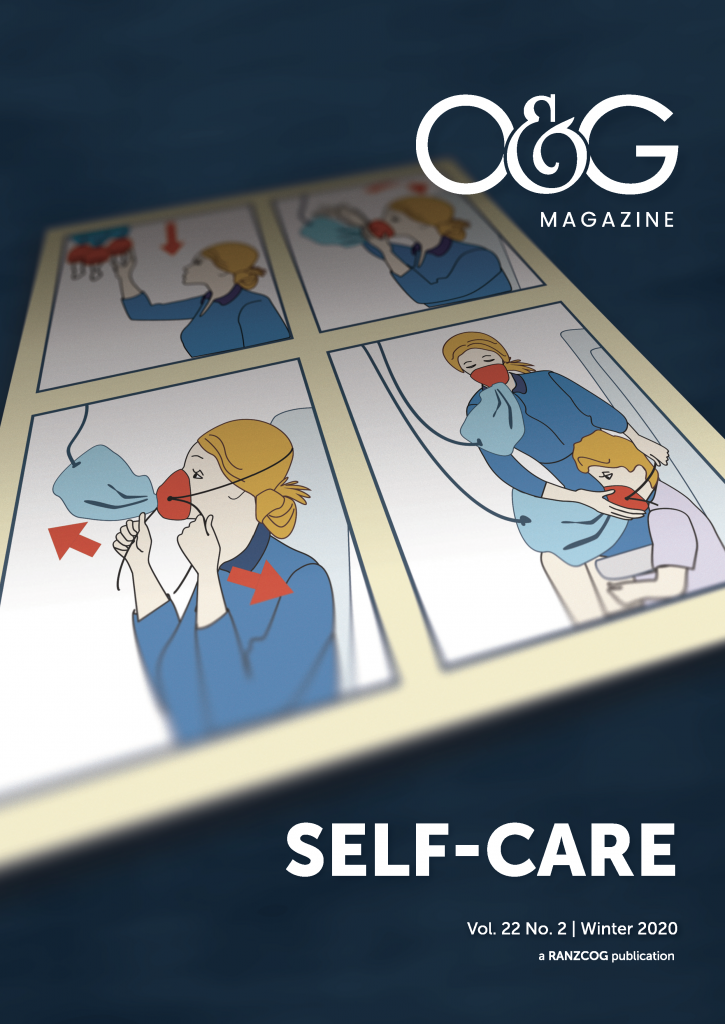RANZCOG has people, services and resources dedicated to help you look after yourself. We want you to be healthy, connected and fulfilled in your work as an O&G, whether you’re an experienced Fellow, an SIMG or a new trainee just starting out. Whatever your career stage, it’s okay to be not okay – we’re here for you, especially as the health system adapts to deal with COVID-19.
Every day, we act to challenge the culture that says asking for help is a sign of weakness, that taking sick leave is not an option, or that you’re the only one who’s not coping. It takes courage and self-insight to reach out for support, and it can be a relief to know you’re not alone.
We recognise that there are limits to self-care. Organisational and systemic factors outside of your control can greatly impact your wellbeing.1 If we focus solely on the individual, ‘we risk … investing resources in sticking plasters when the necessary treatment is a major operation’.2 With that in mind, here are some ways we can help you practice self-care.
College support
Our Member Support Program, Converge, provides confidential support to RANZCOG trainees, SIMGs and Fellows (and their immediate family members) across Australia and New Zealand. You can speak to qualified and experienced counsellors on any issue, such as mental health, personal or work relationship difficulties, legal support or coaching advice for supervisors. All sessions are entirely confidential and your first four sessions, within any 12-month timeframe, are fully subsidised by the College. Sessions may be face-to-face, by video conference or by phone. You can book a session online, or call Converge on 1300 687 327 (Australia) or 0800 666 367 (New Zealand).
We are establishing a Wellbeing Working Group, which will be made up of a diverse cross-section of members and trainees. The Working Group’s aim will be to consult on, determine and establish wellbeing initiatives and functions that provide support for trainees and members throughout their training lifecycle and working life. Dr Paul Howat (FRANZCOG) will be Chair of the group and Dr Katrina Calvert (FRANZCOG) the Deputy Chair.
Carly Moorfield works in the Training Support Unit as a point of contact for trainees who may be struggling with training, work or personal issues. Trainees can call or email Carly for a confidential conversation about what’s happening, what you need and what you might like to do next. Trainees can opt to remain anonymous.
Clare Wells is the College’s Wellbeing Coordinator, a new position that will coordinate wellbeing initiatives for members, trainees and College staff. She will support the Wellbeing Working Group and is also available to contact if you wish to discuss anything related to your wellbeing.
The college is currently reviewing a number of educational resources and programs that support the wellbeing of members and trainees. This includes the Respectful Workplaces face-to-face workshop, which educates individuals on unacceptable behaviours in the workplace and provides strategies and tools to establish a safe working environment. We are also evaluating how to better support, prepare and educate Training Supervisors by reviewing the Training Supervisors workshop. If you have any queries, please contact the Education Programs team at [email protected].
Resources
Our member support and wellbeing hub contains a host of resources to help you take care of yourself, including a list of external support services in Australia and New Zealand.
You can also access:
- the RACGP’s Keeping the Doctor Alive: a self-care guidebook for medical practitioners
- the AMA’s fatigue risk assessment tool
See also the RANZCOG guideline, Fatigue and the Obstetrician Gynaecologist (under review).
We care about you and are here to support you, whatever the stage of your career. If, as you read this, you are reflecting on your wellbeing and feeling like you might need some extra help, be sure to check out our resources, or contact us for a confidential discussion.
References
- Shanafelt T, Noseworthy H. Executive Leadership and Physician Well-being: Nine Organizational Strategies to Promote Engagement and Reduce Burnout. Mayo Clin Proc. 2017;92(1):129-46. Available from: www.mayoclinicproceedings.org/article/S0025-6196(16)30625-5/fulltext.
- Balme E, Gerada C, Page L. Doctors need to be supported, not trained in resilience. BMJ. 2015;351:h4709. Available from: www.bmj.com/content/351/bmj.h4709.







Leave a Reply